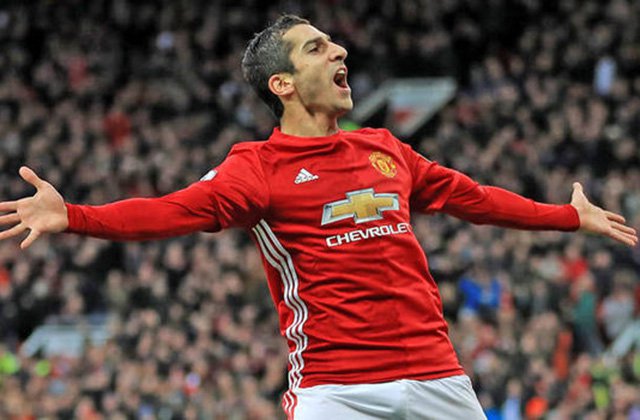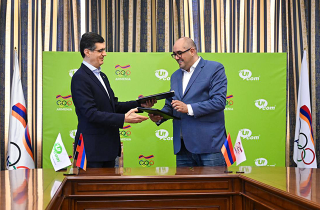Manchester United’s Henrikh Mkhitaryan brings Armenia with him: NY Times

Henrikh Mkhitaryan would be forgiven for not wanting to take his work home with him. His first season in the Premier League has, after all, been a demanding one, enough to make anyone cherish any chance at all to switch off.
There has been the battle to win a place and establish his presence at Manchester United; a collection of wonderful, occasionally gravity-defying goals once he settled in; and then, as the campaign reached its climax, a relentless workload — games piling up in great drifts, culminating in Wednesday’s Europa League final against Ajax in Stockholm.
That would be enough, but Mkhitaryan has always been one of those players who struggle to relax. Early in his career, he tended to switch off his phone for “three days before a game,” so determined was he to focus on the task in hand.
Looking back, at 28, he knows that such intensity was unhealthy; he often felt “sad” for days after games, brooding over every perceived error, reproaching himself for every defeat, screening the calls of his friends and family in case he took out his frustration on them.
He is better at it now, he says, persuaded that it was counterproductive if his “muscles were tense all the time,” but even now it remains a deliberate thing, requiring a conscious effort. He finds it hard to take it easy.
He tries, actively, to take his mind off soccer as much as he can. Mkhitaryan has a regular supper club with his teammates Zlatan Ibrahimovic and Paul Pogba; he goes to the movies as often as time allows. He seeks distraction so he might focus better when needed.
He makes just one exception. No matter how draining his week, Mkhitaryan, the $34 million superstar, always spends hours on YouTube watching grainy coverage of dubious-quality soccer from his native Armenia.
He does not do it for pleasure, particularly; the standard is not a patch on what he experiences in England, even in training. Because there are only six teams in Armenia’s highest league, he admits, he finds the games a little repetitive.
It is eight years now since Mkhitaryan left. In the intervening years, he has played for four clubs (Metalurh and Shakhtar Donetsk, in Ukraine; Borussia Dortmund in Germany; and now United) and picked up four languages (English, German, Russian and Ukrainian) to add to the three that he already spoke (Armenian, French and Portuguese).
He has traveled thousands of miles. His journey has been long, and often lonely. “I did not want to leave, especially,” he said. He did so because of his “dream of playing for one of the world’s biggest teams, in the biggest stadiums, against the biggest opponents,” but it was not easy.
He initially agreed to go to Ukraine “for six months, maybe a year,” assured by Metalurh’s Armenian owner that he would be able to return home if he could not settle there. He found being “so far away from my family” a challenge.
When he moved across the city of Donetsk to Shakhtar, he lived in the club’s training facility; he was nicknamed the President by his teammates. It was only at Dortmund that he agreed to take a club-recommended apartment. It was still difficult — he said he needed a year “to understand German, and 18 months to speak it.”
In retrospect, of course, it has all been worth it. Mkhitaryan already ranks as the finest player his country has produced, and should United beat Ajax on Wednesday, he will be the first Armenian to win a major European trophy.
In his eyes, that is more than a piece of trivia. There is a particular burden on high-profile athletes from low-profile countries; voluntarily or not, they are compelled to play the part of ambassador and evangelist for their nations, charged with presenting the country’s face to the world.
Mkhitaryan says he does not resent it; he would like to think victory against Ajax would not only provide him with a medal but also give others the chance “to find out what Armenia is, where it is.”
It is a subject that came up, again and again, last Friday when he sat in a changing room at Manchester United’s youth academy at Carrington, just south of the city. “Wherever Armenians go, they create a new Armenia” around themselves, he said. He has done just that in Manchester: As well as watching as much soccer from home as he can, he has found an Armenian Apostolic Church — “we were the first country to adopt Christianity, in 301 A.D.,” he points out, with the air of an earnest schoolteacher — although he has not yet had time to visit.
He has become a regular at the Armenian Taverna, sandwiched between a dry cleaner and a bank in the heart of the city. It has been there since 1968, but only since Mkhitaryan started popping in, once a week or so, has it started to attract the flashbulbs of the paparazzi. It is his little echo of home. “The new Armenia in Manchester is in the city center,” he said. “Near me.”
He seeks out other reminders, too. His last trip to the movies was to see “The Promise,” set in 1915, when as many as 1.5 million ethnic Armenians in the Ottoman Empire were killed in what historians have long accepted as a genocide.
It is a subject close to his heart, one he learned in school that remains “central” to the identity of all Armenians, he said. The film is not the usual cinematic fare for players — Mkhitaryan has not discussed it with his teammates, he said; he suspects they would not be interested — but it left him profoundly moved. “To watch it, I was sad in one way and proud in another,” he said.
That word recurs: proud. He is proud that he is, if not the world’s most famous Armenian — an honor that he would admit goes to Kim Kardashian — then at least a standard-bearer for his homeland on the world stage, in a social sense as much as a sporting one.
To some extent, he has an even broader symbolism in the sporting sense. Mkhitaryan is one of only a current handful of players from the former Soviet states at one of the biggest teams in one of Europe’s elite leagues. Schalke’s Ukrainian winger, Yevhen Konoplyanka, is the only other active one he can name.
A region that was once a hotbed for talent, to Western eyes, from Andriy Shevchenko to Kakha Kaladze, has all but dried up. Many English clubs contend it is too hard to scout in Russia and Ukraine because the standard of teams varies so widely; scouring for gems in a place like Armenia would not even occur to them.
“No scouts come to Armenia,” Mkhitaryan said. “And in Russia and Ukraine, because the money is good, the players prefer to stay there, not to come to Europe and develop as footballers.”
Mkhitaryan is the exception. He has made it out, as far as he could have ever dreamed of going. He has not, though, forgotten where it started. He still watches, even now, for that little taste of home.

























